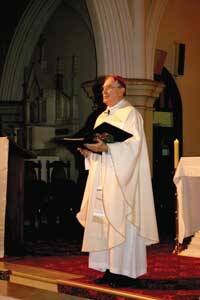The fallout following the forced retirement of Bishop William Morris, of the Diocese of Toowoomba in Australia, has grown more caustic in the days since May 1, the effective date of his removal by Pope Benedict XVI. During a period when many clamor for a more aggressive response from Rome about bishops whose poor judgment delayed remedies for the abuse of children in dioceses around the world, the decision to retire Bishop Morris because of a carefully couched reference to women’s ordination raised eyebrows.
Outraged supporters have rallied around the bishop. Australia’s National Council of Priests first leaped to Bishop Morris’s defense: “We are appalled at the lack of transparency and due process that led to this decision by church authorities,” the council said in a statement. “We are embarrassed about the shabby treatment meted out to an outstanding Pastor.... We are concerned about an element within the church whose restorationist ideology wants to repress freedom of expression within the Roman Catholic Church and who deny the legitimate magisterial authority of the local bishop within the church.”
Bishop Morris had been investigated because of various differences with Rome, his use of general absolution and unorthodox ideas regarding clerical wear among them. But perhaps generating the most tension was a pastoral letter in 2006 that mentioned that the ordination of married men and of women might be part of the solution to the diocese’s acute priest shortage. Bishop Morris has apparently resisted Vatican calls for his resignation since at least 2007 and agreed to leave only after his position had become “untenable.” He told Australian television on May 8 that his departure was intended to “send a message to the bishops of the world...if you ask questions, if you’re in people’s faces long enough, if you’re kind of a nuisance around the place, well, ‘Look what happened to Bill Morris.’” The report that led to his removal has not been made public.
Speaking on behalf of the Vincentians in Australia, Tim Williams, C.M., had harsh words for both the Vatican’s process and for a group of parishioners who persistently urged Bishop Morris’s removal: “[Bishop Morris] has been subjected to criticism from a small number of self-appointed liturgical and doctrinal watchdogs who...see it as their calling to run to sympathetic ecclesiastical authorities with their destructive reports. Just as we wonder at the motivation behind the extremes of terrorism, it is hard to understand what distortion of Christianity drives these watchdogs in their efforts to bring down good people.”
Father Williams concluded: “Bill Morris is a bishop who has dared to indicate he is open to some different thinking in addressing pastoral needs—and for that, it seems, he is being dismissed. To deny others freedom to even think differently surely smacks of a totalitarian regime.”
A statement released by Peter Wilkinson, a spokesperson for Australia’s reform-leaning group Catholics for Ministry, called the process that led to Bishop Morris’s removal a “kangaroo court.” Wilkinson said: “Bishop Morris has never had, as far as is known, any formal charges laid against him by the Vatican, never been shown the evidence gathered against him and never allowed to face as witnesses in public any of his accusers.... Without due process Catholics can have no confidence in their Church’s legal system or trust in those who administer it.”








